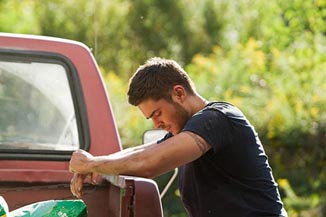Review: The Lucky One
This Sparks Adaptations is Both Lucky and Good
By Tom Houseman
April 25, 2012
BoxOfficeProphets.com

But while The Lucky One seems like an easy source for ridicule based on its promotional material, the film is so earnest that mockery would come off as an act of cruelty tantamount to making fun of a three-legged dog. While the film takes itself seriously, the drama actually feels deserved, as if we are watching real people whose problems are worth caring about. The main characters are an Iraq war veteran (Zac Efron) trying to understand how he survived multiple near-deaths, and a lonely woman (Taylor Schilling) miserable in her home town but unable to leave because of her son. These are situations that seem realistic, and these are sympathetic, multi-dimensional, complicated characters, which is a rarity in romantic dramas.
The most impressive aspect of The Lucky One is how efficient it is. While many cinematic romances wallow in melodrama, feeling the need to make everything as complicated and drawn out as possible, director Scott Hicks and writer Will Fetters waste no time, moving the plot of the film forward at a brisk pace with as few distractions as possible. Each scene serves a specific purpose, either giving us insight into the inner conflicts of the characters or building upon the romance around which the film revolves. There is nothing superfluous; every ounce of fat has been trimmed, which means there are few extravagances that are usually very easy to make fun of.
Efron's protagonist, Logan, is outrageously likeable, to the point that not liking him is practically an illness, one that can either be cured through prolonged exposure in the case of beautiful blondes, or proof of the inherent evilness of their angry ex-husbands. Efron has the goofy charm to pull off this character, making Logan as charismatic as he needs to be to make the love story convincing. In addition, the comedic chops that he displayed in 17 Again are put to good use here, keeping the tone of the film light enough to keep it from devolving into melodrama. It is when Efron is called on to perform an overwrought soliloquy that he reveals his ineptness as a dramatic actor. The direction in these scenes did him no favors, playing up the melodrama to such an extent that even Sparks acolytes will have trouble taking them seriously.
Taylor Schilling is a remarkably competent foil to Efron, and shows that one of the reasons that Sparks adaptations are so successful is that the female leads are as well-developed as the men. Schilling's Beth is a hard-working, strong-willed, independent woman living with her mother (Blythe Danner) and her son (Riley Thomas Stewart). Schilling and Danner are what make the film worth watching, balancing out Efron's aesthetic. They are so down to earth, Schilling with her icy determined glares and Danner with her wry smile and sense of humor, that they effectively counter Efron's dreamy long-off stares that make him seem like he is consistently floating two feet above the ground.
The second half of the film is concerned with pushing the love story forward, which unfortunately is far less interesting than the first half that allows us to watch these very realistic characters in their natural elements. The saving grace of the second half is Riley Thomas Stewart, who manages to be adorable without being cloying, a balance that too many child actors fail to strike. That even this character, who could have served merely as a plot device and an easy way to drum up audience sympathy, is fully fleshed out, is a testament to what The Lucky One does well.
And what it does well, really, is cater to its audience without pandering to them. The obligatory love scene is notable not because it is a great, memorable scene, but because it gives its audience exactly what it wants while still feeling organic and real. The scene is steamy yet chaste and spends just as much time lingering over Efron's arms and abs as it does over Schilling's back and behind. The message is clear: this is a movie that is completely unashamed about being for women, and while men will not find the film repugnant, they will get the distinct sense that this film was not made for their gaze. It might be a stretch to call The Lucky One a good film, but it is certainly effective, and as such, disappointingly difficult to mock. I suppose that is as much a testament to its quality as anything.